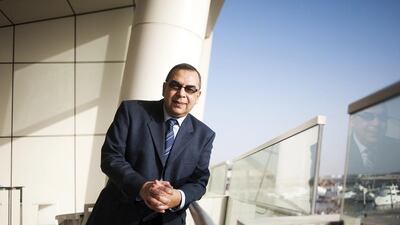Arab readers don’t like sci-fi novels, according to one of the niche genre’s biggest names, Ahmed Khaled Towfik. The Egyptian doctor-turned-prolific writer should know what he’s talking about, with more than 500 Arabic titles to his name, including novels and short stories, and a reputation as the Arab world’s first author to pen horror and science fiction thrillers.
Towfik will discuss his two-decade-long career and his latest book, Like Icarus, in a widely-anticipated session as part of the Emirates Airline Festival of Literature on Thursday (March 9) and Friday (March 10). The talks will be in Arabic with English translation provided.
Towfik has his own theories as to why this genre hasn’t gained the same readership and critical attention in Arab literature.
“The Arab reader likes books that provide social commentary, or romance or drama, or a mild form of philosophy. And of course politics – we love books that combine romance and drama and politics,” he says.
“Stories that lean on science or on technology appear as texts or information books to us in the Arab world, and we believe they won’t provide escapism. We have the imagination as a reader, but it’s just not yet developed enough to embrace science fiction and fantasy, or a plot that is weighted in gloom and horror.”
One of the reasons is that older readers still gravitate towards “facts or truths rather than imagination, because this defines us as Arabs, it is part of who we are, culture-wise”.
Young adults, on the other hand, are an encouraging exception to the rule. “The youth are ready for these types of books,” says Towfik.
“The older generation is too concerned with their own problems; they want to read books that mirror their economic and historical problems. Young people, however, appreciate the connections between art, the imagination and technology. They can grasp a sci-fi theme.”
A medical school graduate and professor of tropical diseases at Egypt’s Tanta University, Towfik says science fiction, horror, thrillers and futuristic novels form a small part of Arabic literature that is published, and which is not seen as a serious pursuit in literary circles.
Not that Towfik initially cared, however. The 54-year-old writes with one reader in mind. “I’m writing for the child inside me; he’s my main reader,” he says.
“I already have a huge interest in science; I pursued it with medicine. To spoil this child inside me, I began writing stories that I would want to read but never found in Arabic.”
But the times are changing, he admits. More Arab adults are interested in sci-fi after paying attention to what their own children are reading and watching.
"This applies to movies as well," he says. "The Arab audience didn't understand Interstellar. They don't realise that movies like Back to the Future and Terminator, for example, are classics [that] have established rules for time travel; that it's not a new genre but a facet of science fiction that has already been fully-developed over the years. These unfamiliar stories are not as respected."
Another sign the tide of indifference is abating is that his acclaimed 2008 dystopian novel, Utopia (an English translation was released by Bloomsbury Qatar Foundation Publishing) will be adapted into a major Arab film production.
Set in Egypt in 2023, Utopia presents a world where the decadent rich live in compounds and the poor are trapped outside in a dog-eat-dog world.
The film will be partly shot in the UAE, something Towfik is pleased about.
“I think the UAE in particular is more ready to embrace science fiction than anywhere else,” he says.
“It is a land of youth, a land of technology, a land crossing boundaries into space. I am amazed by the people of the UAE; they are ready for the new and the different. The future is looking good for science fiction and it will continue to improve in the Arab world, and probably first and foremost in the Emirates.”
There is certainly a new wave of dystopian and surrealist Arab novels, such as Vertigo and The Queue, written by fellow Egyptians Ahmed Mourad and Basma Abdel Aziz respectively.
Then there is Iraqi author Ahmed Saadawi whose Frankenstein in Baghdad won the International Prize for Arabic Fiction in 2014. These writers are using fantasy and science fiction to describe grim political realities.
However, Towfik cautions that it would be incorrect to put the resurgence down to the aftermath of the Arab Spring. This is not the reason for the growing interest in Arab science fiction.
He says the Arab Spring is old news. “We have a huge, growing population of youth, and what they are interested in will make the older generation take note.”
Until then, Towfik is content to write to his modest but dedicated fan base. “I continue writing because although they are small, I still think there is a significant readership, and it’s growing.”
• Dr Ahmed Khaled Tawfiq will join a panel discussion about science fiction across different cultures on Thursday (March 9) at 6pm. He will also appear in an In Conversation session about his latest novel, Like Icarus, Friday (March 10) at 4.30pm. Sessions are held at InterContinental Dubai Festival City. For details go to www.emirateslitfest.com
artslife@thenational.ae

